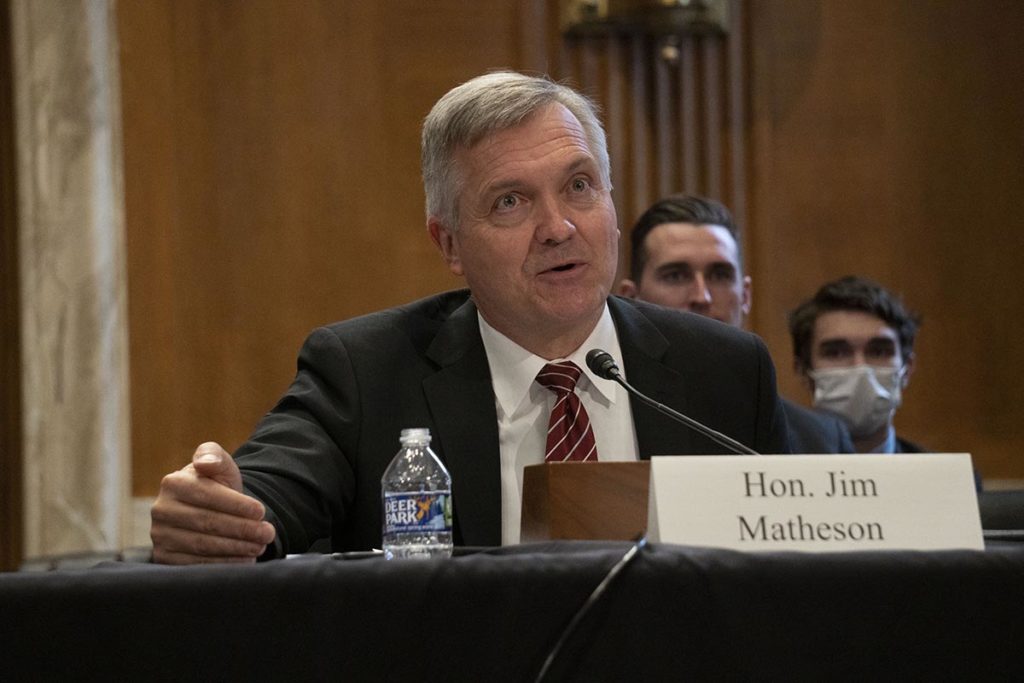
Achieving 100% carbon-free electricity generation by 2035 is an overly ambitious goal that could threaten grid reliability and requires technology that is not yet available, NRECA CEO Jim Matheson told a Senate panel Wednesday.
The Biden administration has set a goal of a carbon-free electric sector by 2035.
“As our nation works to strengthen energy security and reliability while also protecting the environment, we must realize that it is not an all-or-nothing choice,” Matheson testified before the Senate Environment and Public Works Committee. “We can address these priorities—but it requires technology and time beyond what is currently available and what many have called for.”
Matheson said lawmakers should focus on three key points as they consider the nation’s energy future:
• A resilient and reliable electric grid that affordably keeps the lights on is the cornerstone of American energy security and the national economy.
• The ongoing energy transition must recognize the need for time and technology and be inclusive of all energy sources to maintain reliability and affordability.
• The bipartisan infrastructure bill made important investments to support an energy transition, but additional actions on tax credits, permit streamlining and coordination on electrification will be required to meet future energy needs.
Matheson urged senators to oppose efforts to “mandate energy sector transformations over unreasonable or unrealistic timelines and that fail to account for regional differences in energy resource availability or the potential for stranded assets.”
He pointed to a recent long-term reliability assessment by the North American Electric Reliability Corp. warning of the risks of energy shortfalls during extreme weather if too much baseload generation is retired prematurely.
“Such policies would have significant impacts on the reliability and security of the electric grid and could have an undue economic impact on co-op consumer-members, particularly as additional costs must be incurred for replacement generation,” he said at a hearing focused on American energy security and investments in clean energy technologies.
Electric cooperatives are accelerating energy innovations and investments in clean energy to reduce carbon emissions, Matheson said. Co-ops lowered their CO2 emissions by 23% between 2005 and 2020—the equivalent of taking nearly 9 million cars off the road.
“As electric co-ops continue to reduce CO2 and other emissions, it is critical that policymakers work with industry in a constructive manner that achieves these objectives while maintaining the exceptional reliability and affordability that American families and businesses expect and deserve,” Matheson said.
The electric sector is poised to play a major role in reducing carbon emissions through increased electrification of the transportation, agricultural and industrial sectors, he said.
“Electrifying other sectors of the economy, however, will require a three-fold expansion of the transmission grid and up to 170% more electricity supply by 2050, according to the National Academies of Sciences,” Matheson testified.
“The increasing role of electrification will place more demands on the electric grid and generation portfolio, and measures to enhance grid reliability are essential to maximize emission reductions and keep costs affordable.”
The bipartisan Infrastructure Investment and Jobs Act passed by Congress last November “included significant opportunities for electric co-ops and the communities they serve through programs supporting clean energy deployment, grid resiliency and modernization, physical and cybersecurity, electric vehicles, and rural broadband,” Matheson said.
But he said more must be done to provide tax incentives, streamline the permitting process and coordinate electrification efforts.
“Policymakers must continue to balance realism with aspiration while recognizing that any energy transition will require additional time and technology and must be inclusive of all energy sources to maintain the reliability and affordability that is the cornerstone of American energy security.”
Erin Kelly is a staff writer for NRECA.